Clarinet Studio Policies
1. Payments
Lessons cost $30 per half hour, $40 per 45 minutes, and $50 per hour. Lessons are to be purchased up front by the month, and are payable directly to me. Depending on how long the month is and the day of your lesson, you will most likely be paying for four or five lessons at a time. I will monitor your balance of lesson credits. If for any reason I have to cancel a lesson, that credit will roll over into the next week. Please remember that in order for you to cancel a lesson and not be charged for it, you must call me at least 24 hours before your lesson!
2. Attendance
If you can’t make a lesson, please call me at least 24 hours before your lesson. Lessons cancelled in advance will be made up. If the student does not call, or calls too late, that lesson will not be subject to a make up and the lesson credit will be forfeited. Please notify me as soon as possible of any scheduling conflicts such as vacation days, doctor’s appointments, etc., so that I may plan on no lesson that day, and you will not be charged.
Here is my contact information:
Email: Katelain@gmail.com
Phone: (401) 301-5852
A note about braces and orthodonture: many students are not able to play clarinet after an orthodontist appointment without experiencing pain and discomfort. Please cancel your lesson if you have an orthodontist appointment the same day.
3. Equipment and Preparedness for Lessons
Clarinet
Obtaining an instrument and keeping it in good playable condition is the student’s responsibility. Please do not come to a lesson with an unplayable instrument. In order to keep your clarinet in good playing condition, remember to swab it after every playing session and treat it gently (please don’t throw it in the case or fight lightsaber battles with it). You are responsible for bringing the instrument to a repair shop when repairs are needed. An annual clarinet tune up and preventative maintenance check at the repair shop is also a good idea.
Reeds
Please have at least four reeds in your case at all times! These reeds should be ones that you have test played and broken in at home beforehand. They should all feel comfortable enough for you to play in a concert or band rehearsal setting.
Music
Having your music and lesson books at your lesson is a huge part of being prepared. Please don’t forget your books. When you are given a new book title to purchase, please be sure to obtain the book right away. It is very important for a musician to build their library of music and repertoire for their instrument, and photocopies from my books don’t count! For your convenience, books and music can be purchased directly from me, or can easily be ordered from a local music store, sheetmusicplus.com, or even amazon.com.
Notebook
Students should have a small notebook at their lesson to write down their weekly assignments and take notes on things we may discuss in the lesson (music theory concepts, notes about taking care of reeds, etc). The notebook should be at least 5”x7”.
Pencil
Students should always have a pencil in their case to mark their music. Always mark your music when and where you need to! Don’t be afraid to write in an accidental, circle a tricky passage, or underline a tempo change. These are all signs that you are practicing and learning your music, and even the professionals do it! That said, marks should always be made in pencil so that they can be easily erased later, especially if the music does not belong to you!
4. Practicing at Home
To practice your instrument, you’ll need a few things:
- a quiet, secluded space to practice in
- a music stand
- a comfortable chair without arms
- a pencil
- a metronome (if you don’t have one, you can google “metronome” for some good free ones online. I personally like www.metronomeonline.com. The metronome is easy to use, and there are some good articles on the site about learning music. Metronome apps can also be found for iphone and android, either for free or for a fee.)
- a tuner is a good tool for intermediate and advanced students to have to check their pitch. It is not necessary for a beginner student to buy a tuner; however, using one will help you become more familiar with how your instrument plays, and what notes might be sharp or flat.
Some small and inexpensive metronome/tuner combos are available on the market that might help save some money in equipment purchases!
5. Preparing for Auditions
Auditioning for festivals and competitions is part of learning an instrument. I encourage all of my students to challenge themselves to audition for local groups such as the RIMEA All-State Festival and the Solo and Ensemble Festival, but I leave the final decision up to the student. I will be of assistance in choosing and learning an audition piece to play, practicing up on scales, practicing sight-reading, and any other audition requirements.
6. Ensemble Music in the Lesson
The purpose for private music lessons is to have a place where the student can learn at their own pace outside of the school music program. Many times, students will end up getting ahead of their school program in terms of the music that they can play. There are times, however, when the band director may assign a piece with challenging passages. While I believe that the private lesson is not a place to solely learn and practice for band, I am willing to assist in learning difficult and tricky passages from pieces assigned in school, as long as assignments from the lesson studio are not overlooked.
